- Carroll Community College is Carroll County's premier learning community for convenient, affordable, state-of-the-market postsecondary training, baccalaureate preparation, and lifelong education. As a learning-centered college, Carroll embraces student learning as its primary and defining mission; encourages students to be full and active partners in learning; creates an environment supporting student and organizational learning; assesses learning outcomes and uses the results to improve learning; and evaluates all areas of the college by how well they foster learning.
School Highlights
Carroll Community College serves 3,998 students (24% of students are full-time).
The college's student:teacher ratio of 11:1 is lower than the state community college average of 12:1.
Minority enrollment is 24% of the student body (majority Black and Hispanic), which is less than the state average of 63%.
Quick Stats (2025)
- Enrollment: 3,998 students
- In-state tuition: $5,002
- Out-state tuition: $6,989
- Student:teacher ratio: 11:1
- Minority enrollment: 24%
- Source: Integrated Postsecondary Education Data System (IPEDS)
Top Rankings
Carroll Community College ranks among the top 20% of public schools in Maryland for:
Category
Attribute
Completion Rates
School Overview
The teacher population of 378 teachers has stayed relatively flat over five years.
Carroll Community College
(MD) Community College Avg.
Carnegie Classification
Associate's Colleges: Mixed Transfer/Career & Technical-Mixed Traditional/Nontraditional
Associate's Colleges: Mixed Transfer/Career & Technical-High Traditional
Institution Level
At least 2 but less than 4 years
At least 2 but less than 4 years
Institution Control
Public
Public
Total Faculty
378 staff
378 staff
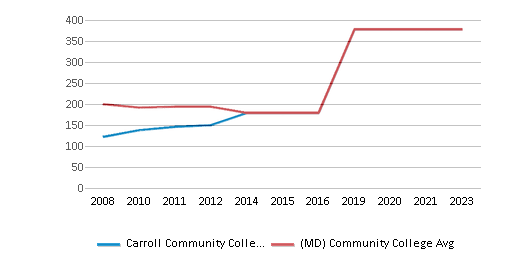
Student Body
The student population of Carroll Community College has grown by 27% over five years.
The student:teacher ratio of 11:1 has increased from 8:1 over five years.
The Carroll Community College diversity score of 0.41 is less than the state average of 0.75. The school's diversity has grown by 34% over five years.
Total Enrollment
3,998 students
3,998 students
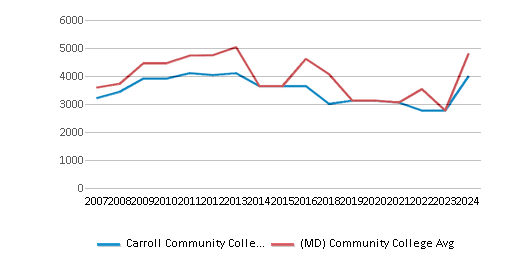
Student : Teacher Ratio
11:1
12:1
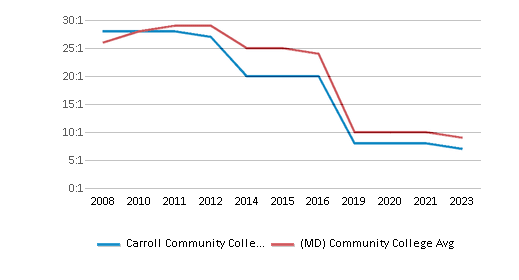
# Full-Time Students
947 students
985 students
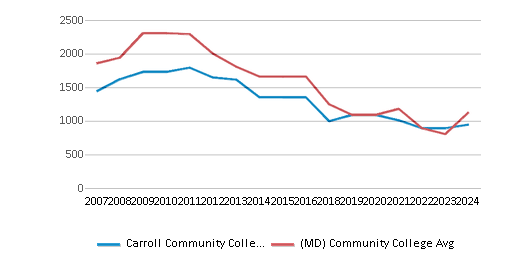
# Part-Time Students
3,051 students
3,409 students
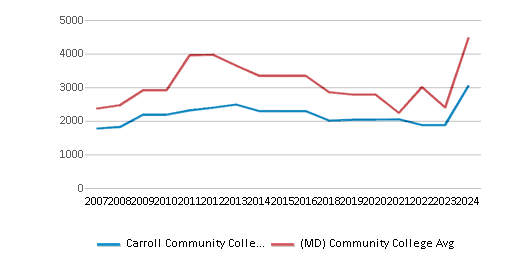
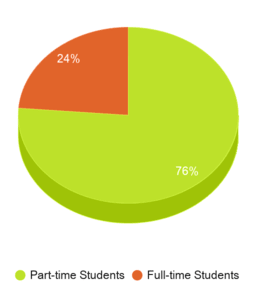
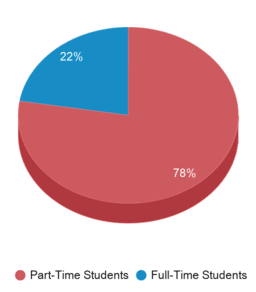
# Enrollment Undergraduate
399 students
243 students
# Full-Time Undergraduate Students
947 students
985 students
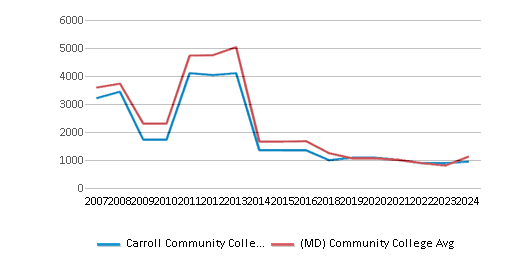
# Full-Time Graduate Students
n/a
19 students
# Part-Time Undergraduate Students
3,051 students
4,482 students
% American Indian/Alaskan
n/a
n/a
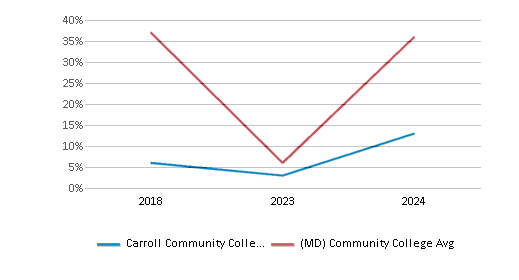
% Asian
4%
7%
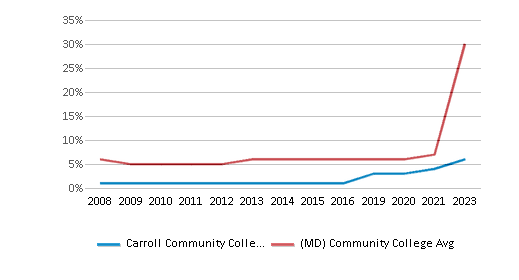
% Hispanic
6%
13%
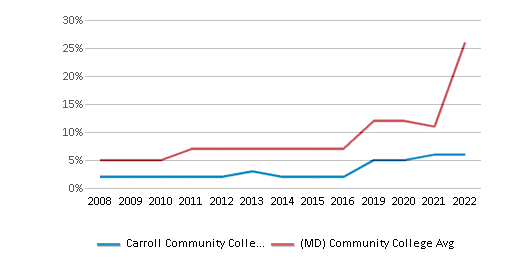
% Black
7%
30%
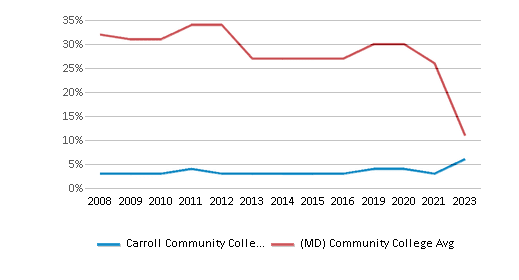
% White
76%
37%
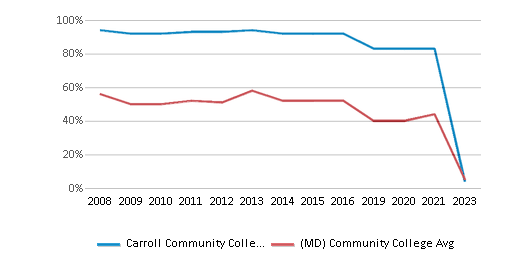
% Hawaiian
n/a
n/a
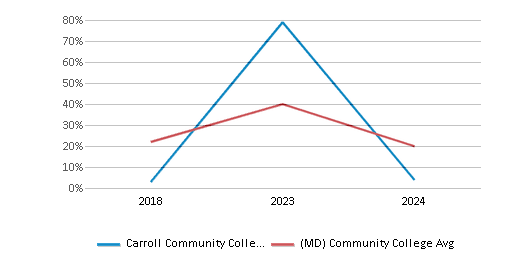
% Two or more races
5%
5%
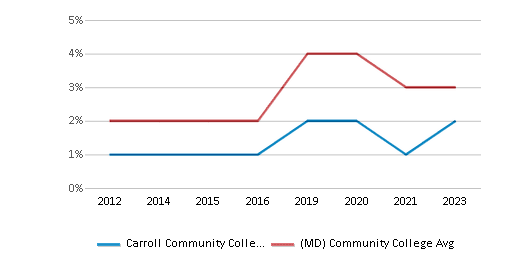
% Non Resident races
n/a
5%
% Unknown races
1%
3%
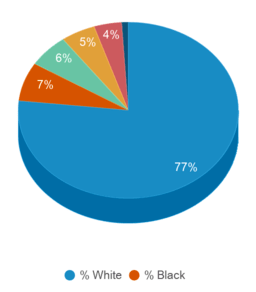
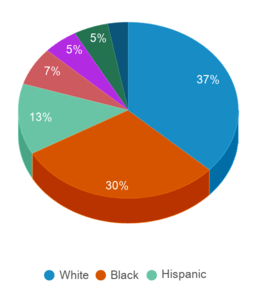
Diversity Score
0.41
0.75
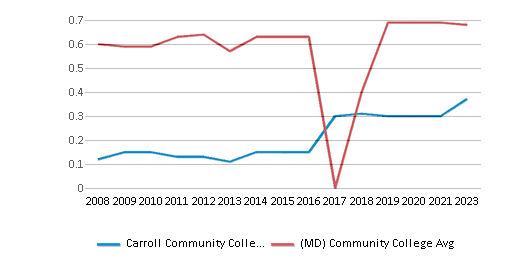
College Completion Rate (Students who graduate in less than 4 years)
0.4171%
0.2841%
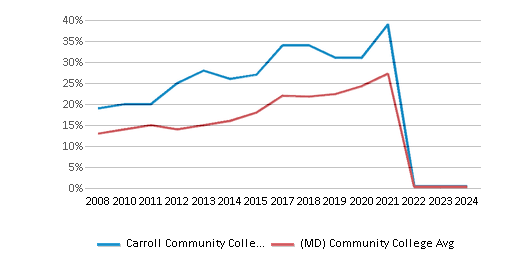
Average Graduate Earnings (10 Years)
$35,900
$36,700
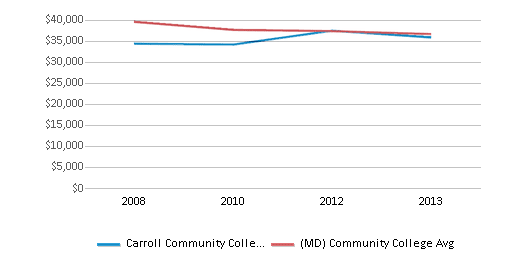
Tuition and Acceptance Rate
The public in-state tuition of $5,002 is less than the state average of $7,307. The in-state tuition has declined by 24% over four years.
The public out-state tuition of $6,989 is less than the state average of $9,316. The out-state tuition has declined by 16% over four years.
In-State Tuition Fees
$5,002
$7,307
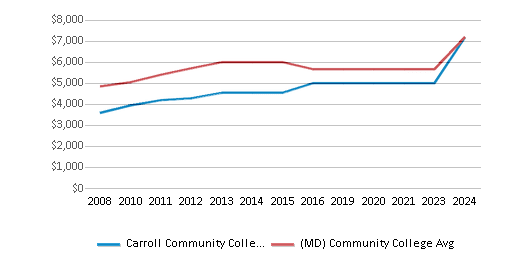
Out-State Tuition Fees
$6,989
$9,316
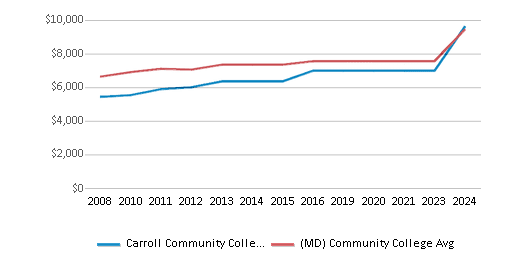
% Students Receiving Some Financial Aid
64%
72%
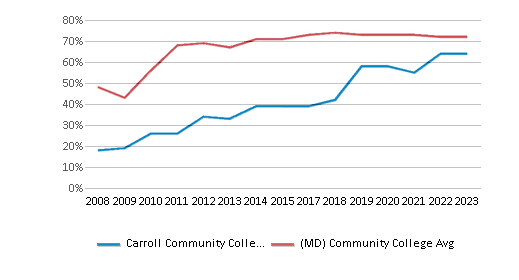
Median Debt for Graduates
$12,000
$10,000
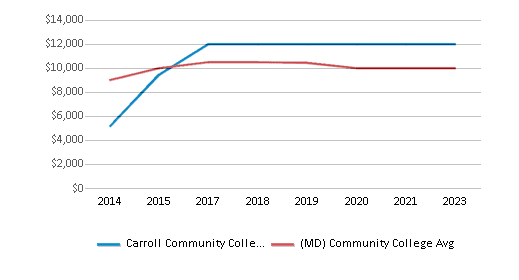
Median Debt for Dropouts
$5,500
$5,500
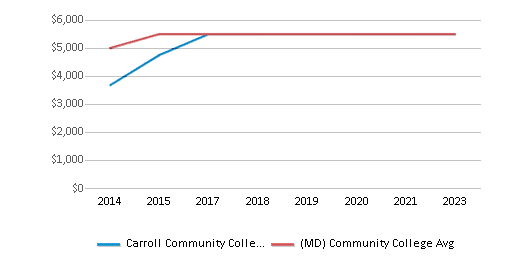
Acceptance Rate
n/a
100%
Source: 2024 (or latest year available) Integrated Postsecondary Education Data System (IPEDS)
School Notes
- Carroll Community College has a long, rich history of remarkable growth. The college has evolved from a small rural campus to an 80-acre property marked by modern architecture, housing classrooms with state-of-the-art technology. In 1976 Carroll Community College opens on South Center Street as a branch campus of Catonsville Community College and in 1990 Washington Road campus opens with Great Hall, Classroom Building One. The physical growth of the campus continues to flourish. In 1997, the Random House Library building was built. The Fine Arts, Business Training Center and Life Fitness buildings were completed in 2002. In addition, the Nursing and Allied Health building was completed in 2004. The college offers programs in the field of Allied Health, Business Administration, Criminal Justice, Fine & Performing Arts, Teacher Education, Technical Studies and Transfer Programs. The College is accreditated by the Commission on Higher Education of the Middle States Association of Colleges and Schools.
Frequently Asked Questions
How much does Carroll Community College cost?
Carroll Community College's tuition is approximately $5,002 for In-State students and $6,989 for Out-State students.
What is Carroll Community College's ranking?
Carroll Community College ranks among the top 20% of community college in Maryland for: Highest completion rates.
School Calendar
View the Carroll Community College yearly calendar below. Note key dates such as:
Event
Date
College closed- Spring Break 2025
March 23, 2025 (Sunday)
College closed- Spring Break 2025
March 24, 2025 (Monday)
College closed- Spring Break 2025
March 25, 2025 (Tuesday)
College closed- Spring Break 2025
March 26, 2025 (Wednesday)
College closed- Spring Break 2025
March 27, 2025 (Thursday)
Recent Articles

Obtaining Your Bachelor's Degree at a Community College
Explore the evolving landscape of community colleges offering bachelor's degrees, addressing affordability, accessibility, and workforce needs.

A to Z of Community College Certificates and Courses
From business and healthcare to technology and skilled trades, the article showcases the breadth of options available to students seeking to enhance their knowledge, develop new skills, or pursue career advancement.

What is a Community College?
This comprehensive guide explains what a community college is, its history, and its role in higher education. It covers the types of programs offered, differences from four-year colleges, benefits of attending, and important considerations for prospective students, providing valuable insights for those exploring educational options.









